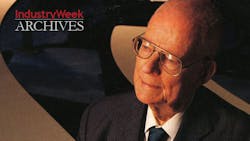Dr. Deming: 'Management Today Does Not Know What Its Job Is' (Part 1)
Perhaps no one worked harder or enjoyed his job more than Dr. W. Edwards Deming. Less than two weeks before his death late last month at age 93, he was conducting one of his four-day seminars in Los Angeles. Always learning, Dr. Deming continued to integrate new ideas into his inspiring presentations. On a sunny Saturday morning last Oct. 23, sandwiched between his seminars in Detroit and Richmond, we had a chance to meet for a few hours at his home in Washington. Seated at a small circular table in his modest kitchen, we chatted over his breakfast of Quaker Oats granola with milk and cream, toast, and tea.
Though Dr. Deming’s legacy will be that of the man who transformed Japan into a formidable business competitor, a sometimes gruff taskmaster who wouldn’t visit a company unless he could talk to the man at the top, I was taken by his patience, warmth, and caring nature....like the wise great-grandfather he was.
While he focused intently on his topic throughout our discussion, afterward we spoke of family and travels, and he offered to find time for us to talk in the future. His passing makes our get-together that much more meaningful and his timeless words even more valuable.
lW: Things are so much different now than when you were formulating your 14 points for transformation of American management. Are you saying anything now that you weren't saying before?
Dr. Deming: No. The 14 points are good enough for me.
IW: What can you say to IndustryWeek's readers that they might benefit from and apply to the way they are running their businesses?
Dr. Deming: Management today does not know what its job is. In other words, [managers] don't understand their responsibilities. They don’t know the potential of their positions. And if they did, they don't have the required knowledge or abilities. There's no substitute for knowledge.
IW: What is their job?
Dr. Deming: What should be the aim of management? What is their job? Quality is the responsibility of the top people. Its origin is in the boardroom. They are the ones who decide. Quality means what will sell and do a customer some good--at least try to. The customer is the one who supports us. We have to present to him something that he needs, in a way that he can use it. Study his needs, get ahead of him. The customer invents nothing. The customer does not contribute to design of product or the design of the service. He takes what he gets. Customer expectations? Nonsense. No customer ever asked for the electric light, the pneumatic tire, the VCR, or the CD. All customer expectations are only what you and your competitor have led him to expect, He knows nothing else.
IW: What then is the source of innovation?
Dr. Deming: The source of innovation is freedom. All we have—new knowledge, invention—comes from freedom. Somebody responsible only to himself has the heaviest responsibility. “You cannot plan to make a discovery," Irving Langmuir said. Discoveries and new knowledge come from freedom. When somebody is responsible only to himself, [has] only himself to satisfy, then you'll have invention, new thought, now product, new design, new ideas.
IW: How does a company, a research manager, a manager of people create an environment where there is freedom?
Dr. Deming: Give people a chance to make use of their diverse abilities, capabilities, family life, education, hopes. Help them to accomplish their aim.
lW: One of your more controversial ideas is eliminating performance evaluations.
Dr. Deming: Well yes, because you cannot measure performance. Appraisal of people is ruinous. You cause humiliation, crush out joy of learning, innovation, joy on the job. Most of what anybody does is governed by the system that he works in. You are not evaluating him, you are evaluating the interaction with him and the system, the rules and constraints he works in.
lW: I like one of your quotes, which is “Reward for good performance may be the same as reward to the weatherman for a nice day."
Dr. Deming: That's about right.
IW: What is the alternative?
Dr. Deming: The alternative is joy on the job. To have it, people must understand what their jobs are, how their work fits in, how they could contribute. Why am I doing this? Whom do I depend on? Who depends on me? Very few people have the privilege to understand those things. Management does not tell them. The boss does not tell them. He does not know what his job is. How could he know? When people understand what their jobs are, then they may take joy in their work. Otherwise, I think they cannot.
